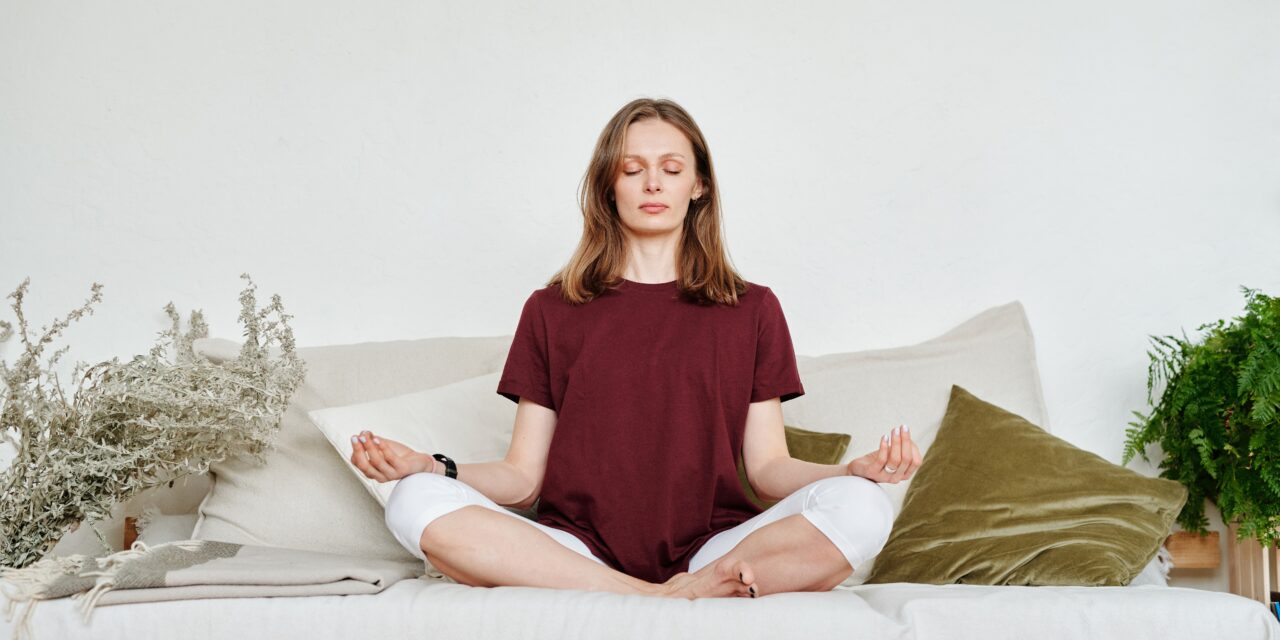Anxiety and sleep are two issues that often go hand in hand. Anxiety can make it hard to get to sleep or stay asleep, and a lack of sleep can increase anxious feelings. However, meditation is one tool that can help with both anxiety and sleep issues. This article will discuss the benefits of anxiety meditation on sleep quality and provide a guided meditation to try.
What to expect from our article
How Anxiety Affects Sleep
There are several ways that anxiety can impact sleep. Your mind may race with worries and concerns, which can make it difficult to fall asleep. You might experience frequent nighttime awakenings as a result of it, which would disrupt your sleep and make you feel exhausted and cranky the next day.
When you feel anxious, your body releases hormones like cortisol and adrenaline. This is called the “stress response.” It may be challenging to unwind and go to sleep when these hormones are present. Anxiety can also cause physical symptoms like a racing heart, shallow breathing, and tense muscles, which make it hard to relax and fall asleep.
How Mediation Can Be Beneficial
Meditation can help you sleep better because it can help you feel less anxious and more relaxed. It has been shown that meditation can promote a sense of calm and lessen feelings of anxiety by lowering the release of stress hormones like cortisol and adrenaline.
When you meditate, you concentrate on your breathing, which can lower your heart rate and encourage relaxation. Mindfulness is another benefit of meditation; it enables you to observe your thoughts and emotions without passing judgement. This can assist you in recognising and dealing with anxious thoughts and feelings, decreasing the likelihood that they’ll keep you up at night.
Meditation Instructions for Sleep and Anxiety:
Here is our guided meditation technique to reduce stress and enhance sleep:
- Find a quiet and comfortable place where you won’t be disturbed.
- Sit or lie down in a comfortable position, and close your eyes.
- Take a few slow, deep breaths while exhaling through your mouth instead of your nose. Release any tension you may be holding in your body with each exhalation.
- Bring your attention to your breath and begin to slow it down. Take a few long, deep breaths, exhaling and inhaling through your nose.
- Imagine yourself breathing in peace and relaxation as you inhale. Imagine yourself exhaling any tension or anxiety you may be experiencing as you exhale.
- If your thoughts begin to stray, gently refocus on your breathing.
- Imagine a serene setting, such as a tranquil forest or the ocean. Allow yourself to completely unwind as you picture yourself in this serene setting.
- Continue to breathe deeply and unwind as you tell yourself something reassuring, like “I am calm and relaxed” or “I am safe and protected,” over and over again.
- Allow yourself to fall peacefully asleep if you start to feel sleepy.
How long does it take for meditation to get rid of anxiety?
The amount of time it takes for meditation to help reduce anxiety can vary depending on several factors, such as the frequency and duration of your meditation practice, the severity of your anxiety, and how consistently you practise meditation.
While some individuals may experience immediate relief from anxiety symptoms after only a few minutes of meditation, for others, it may take several weeks or months of consistent practise to see noticeable changes. This is due to the fact that meditation is a skill that requires both consistent practise and time to master.
Meditation should not be seen as a quick fix for anxiety. Instead, it should be seen as a long-term way to deal with symptoms. Meditation can help rewire your brain to help you deal with anxiety better and feel more at ease, but for a comprehensive anxiety treatment plan, it should be combined with other methods like therapy, exercise, and self-care.
Each person will experience the benefits of meditation differently and at a different pace. But with regular practise, patience, and a whole-person approach to dealing with anxiety, meditation can be a powerful tool for improving mental and emotional health.
How long should you meditate for?
How long you should meditate depends on a number of things, such as your level of experience, the type of meditation you use, your schedule, and your personal preferences.
For people who have never meditated before, it’s best to start with shorter sessions and build up to longer ones over time. By doing so, you can avoid feeling overwhelmed or discouraged while developing the habit of meditation. If you’re new to meditation, a good place to start is with 5–10 minutes per day. As you get more accustomed to it, you can gradually extend the time.
Longer sessions might prove to be more beneficial as your meditation skills improve. The ideal amount of time for meditation can vary from person to person, but for the best results, most experts advise doing it once or twice a day for at least 20 to 30 minutes each time.
However, it’s important to keep in mind that the quality of your meditation practice is more important than the quantity of time you spend meditating. Even a short session of just a few minutes can be beneficial if you are fully present and focused during that time.
In the end, you should decide how long you should meditate based on your own needs and preferences.It’s crucial to pay attention to your body and find a meditation routine that feels enjoyable and sustainable for you over the long term.
Conclusion:
It can be hard to deal with anxiety and sleep problems, but meditation can help relieve stress and help you get a good night’s sleep. Regular meditation can help you manage your anxious thoughts and feelings better, reduce stress, and feel more at ease. Try our guided meditation for a few weeks to see how it can improve your sleep and general well-being.












